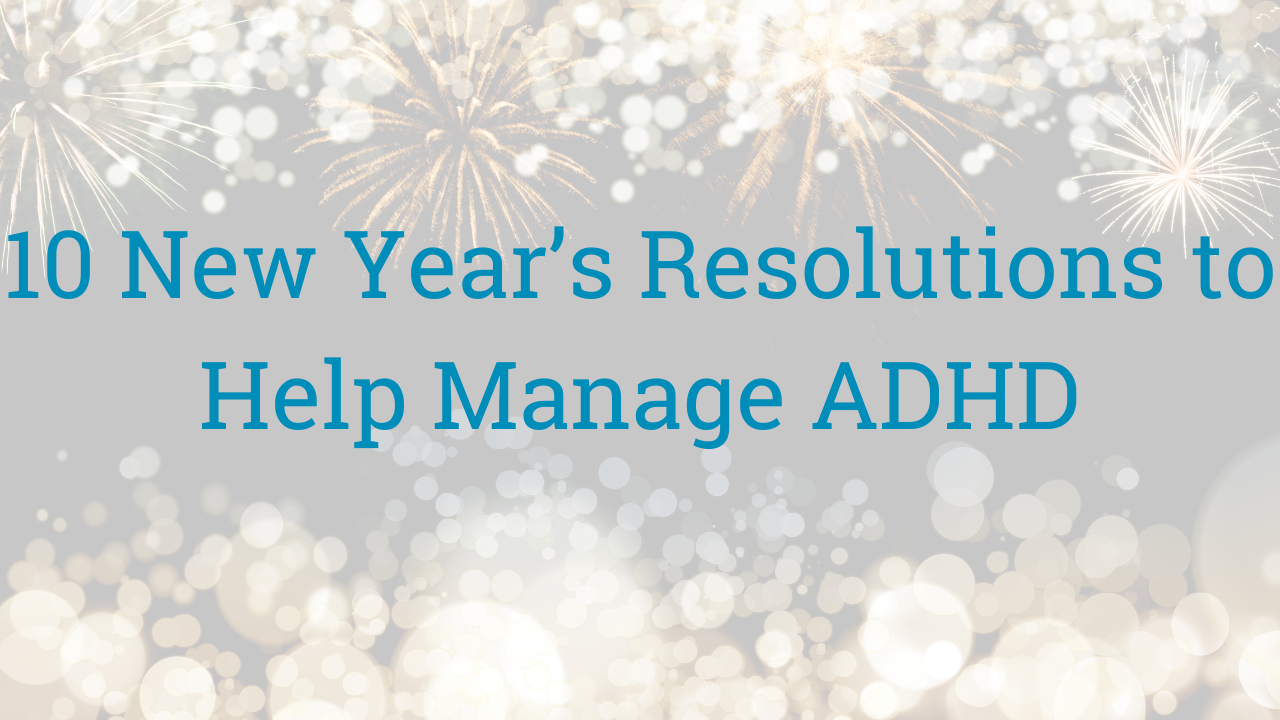
10 New Year’s Resolutions to Help Manage ADHD
As the new year begins, it’s a great time to set resolutions that promote mental and physical wellness and improve your day-to-day life. If you have ADHD, resolutions focused on organization, self-care, and healthy habits can make a world of difference.
Here are 10 New Year’s resolutions designed to help manage ADHD:
1. Prioritize Consistent Routines
One of the most effective ways to manage ADHD is by establishing a structured daily routine. Set specific times for waking up, eating, working, and going to bed. Consistency can help reduce the chaos that often comes with ADHD and create a sense of predictability.
2. Break Tasks Into Smaller Steps
People with ADHD often feel overwhelmed by large tasks. This year, commit to breaking tasks into smaller, manageable steps. Writing down each step and crossing them off as you complete them will give you a clear path and make the process feel less daunting.
3. Use Timers to Stay on Track
Staying focused can be difficult, so using timers or alarms to limit the time spent on specific tasks can help. Whether it’s setting a timer to work for 20 minutes and taking a 5-minute break or using an alarm to remind you to switch tasks, this technique can improve focus and productivity.
4. Get Organized and Stay Tidy
Clutter can be particularly distracting for people with ADHD. Make a resolution to declutter one area of your home or workspace each week. Keep things organized by using labels, storage bins, or digital apps that help you stay on top of tasks and appointments.
5. Practice Mindfulness and Relaxation Techniques
Mindfulness practices, such as deep breathing, meditation, or yoga, can help reduce stress and improve focus. Commit to spending a few minutes each day practicing mindfulness to center yourself and calm your mind, especially when feeling overwhelmed.
Need a guided meditation? Here’s one from Certified ADHD Coach Pam Valdes:
6. Set Achievable Goals
Goal-setting can be challenging for those with ADHD, as long-term goals can feel unattainable. This year, focus on setting smaller, short-term goals that are realistic and achievable. Celebrate your accomplishments along the way to keep your motivation high.
Learn more about SMART goals here.
7. Exercise Regularly
Exercise has been shown to improve focus and mood for people with ADHD. Set a goal to incorporate physical activity into your routine, whether it’s going for a walk, joining a fitness class, or practicing sports. Exercise helps reduce restlessness and boosts mental clarity.
8. Limit Distractions
To stay productive, it’s important to minimize distractions. Commit to creating a workspace that limits distractions—such as turning off notifications, using noise-canceling headphones, or finding a quiet space to focus. Reducing external distractions can help you stay on task.
9. Practice Self-Compassion
ADHD can sometimes lead to feelings of frustration and self-criticism. Make a resolution to be kinder to yourself. Practice self-compassion by acknowledging that ADHD may make certain tasks more challenging, but it doesn’t define you.
Remember to treat yourself with patience and understanding.
10. Seek Support When Needed
Managing ADHD can be overwhelming, but you don’t have to do it alone. This year, consider seeking professional support. Whether it’s through therapy, coaching, or joining an ADHD support group, connecting with others can provide guidance and boost your motivation.
How Pam Valdes, Certified ADHD Coach, Can Help

Pam Valdes is a certified ADHD coach who specializes in helping individuals with ADHD create strategies tailored to their unique challenges. She works with clients to establish routines, improve focus, and set realistic goals that lead to lasting success. Pam’s empathetic, non-judgmental approach ensures that clients feel supported while they work toward their goals. Her personalized coaching can help you develop actionable strategies to manage ADHD and make progress in all areas of life.
If you’re looking for support in managing ADHD this year, the Next Step 4 ADHD team is here to help. Contact our team today to schedule a coaching session and start the new year with a clear plan for success.
Learn More
How to Tame Your Inner Critic
Living with ADHD often means battling an inner critic—a persistent voice that points out mistakes, amplifies insecurities, and keeps you stuck in a cycle of self-doubt.
While this critical voice can be loud, you don’t have to let it take control. Here’s how to tame your inner critic and boost your confidence:
1. Recognize the Inner Critic
The first step is identifying when your inner critic is speaking. Pay attention to negative self-talk like, “I’ll never get this right” or “I’m always messing things up.” Awareness is the key to shifting the narrative.
2. Challenge Negative Thoughts
Once you notice your inner critic, challenge its accuracy. Ask yourself: Is this thought true? Is there evidence to support it? Often, the inner critic exaggerates or distorts reality.
3. Practice Self-Compassion
Replace harsh criticism with kindness. Remind yourself that mistakes are part of being human—and part of learning. Treat yourself with the same patience and understanding you’d show a close friend.
4. Reframe Your ADHD Struggles
Instead of viewing ADHD traits as flaws, see them as differences. For example, impulsivity might be reframed as spontaneity, and hyperfocus as dedication. This shift in perspective can quiet the critic.
5. Create a Supportive Environment
Surround yourself with people who understand and value you. Friends, family, or ADHD coaches can help you counterbalance the negativity of your inner critic with encouragement and support.
6. Celebrate Small Wins
Acknowledge your successes, no matter how small. Completing a task, staying organized for a day, or simply showing up are all victories that deserve recognition.
7. Use ADHD-Friendly Tools
Structure and systems can help quiet the critic by reducing overwhelm. Tools like planners, reminders, and timers make it easier to manage tasks and reinforce your sense of control. Learn more about making SMART goals here.
8. Seek Professional Support
Sometimes, the inner critic is deeply ingrained and hard to overcome on your own. Therapy or ADHD coaching can provide personalized strategies to build self-esteem and resilience.
Find More Tips on Our Coaching Corner
For even more strategies on managing ADHD, check out the Coaching Corner page, where our ADHD coach Pam Valdes shares practical tips to help you stay focused and motivated.
Pam’s expertise can provide you with additional tools to make daily tasks more manageable and engaging. Whether you’re looking for new ways to approach time management or need help with organization, Pam’s advice can make a difference!
Tune into the video below to hear Certified ADHD Coach Pam Valdes speak more on the topic:
At Next Step 4 ADHD, we understand how challenging self-doubt can be for those with ADHD. Our team is here to help you overcome the inner critic and embrace your strengths. Visit our Coaching Corner for tips and strategies tailored to ADHD or schedule a session with one of our professionals today!
Learn More
How to Make Boring Tasks Interesting
We all have tasks that feel dull and unmotivating, but for those with ADHD, staying focused on these activities can be even more challenging. The good news is there are ways to make boring tasks more engaging by stimulating your senses.
Tips to Liven Up Boring Tasks
- Listen to Music: Create a playlist with upbeat songs that keep your energy up. Music can turn an otherwise monotonous activity into something more enjoyable. Experiment with different genres to see what helps you focus.
- Drink Cold Water: Keep a cold glass of water nearby while working on tasks. The refreshing sensation can help keep you alert and give your mind a quick boost of energy when you’re feeling distracted.
- Change Scents: Use essential oils or a scented candle to create a pleasant environment. Certain scents, like peppermint or citrus, can increase focus and make the workspace more inviting.
- Incorporate Movement: Try standing, walking, or using a fidget tool to keep your body engaged while you work. Physical movement can help channel excess energy and improve focus.
- Break Tasks into Smaller Steps: Completing small, achievable goals can help keep momentum going and make tasks feel less overwhelming. Learn more about SMART goals here.
Find More Tips on the Coaching Corner
For even more strategies on managing ADHD, check out the Coaching Corner page, where our ADHD coach Pam Valdes shares practical tips to help you stay focused and motivated.
Pam’s expertise can provide you with additional tools to make daily tasks more manageable and engaging. Whether you’re looking for new ways to approach time management or need help with organization, Pam’s advice can make a difference!
Tune into the video below to hear Certified ADHD Coach Pam Valdes speak more on the topic:
Signs You Should Reach Out for ADHD Help
It’s common to feel overwhelmed or distracted occasionally, but if you notice that ADHD symptoms are interfering with your daily life, it might be time to seek professional help.
Struggling with focus, missing deadlines, feeling disorganized, or becoming easily frustrated are all signs that your ADHD may need more attention.
How Next Step 4 ADHD Can Help
At Next Step 4 ADHD, we offer personalized treatment plans designed to meet your unique needs. Whether it’s through therapy, coaching, or medication management, our experienced team can help you regain control of your daily routine and overcome the challenges that come with ADHD. Reach out to us for support and guidance, and take the next step toward a more focused and fulfilling life!
Click to request an appointment.
Learn More
Why Do I Feel So Overwhelmed?
Sometimes our feelings of overwhelm are a result of our thoughts and self-talk. If you feel like you live with a harsh inner critic that bombards you with worry and negative self-talk, there is good news: You can learn how to talk to yourself supportively, as you would talk to a friend.
The idea is to create “underwhelm,” so that you have “I can do this” and “I’ve got this” thoughts. When you’re overwhelmed by negative thoughts, it’s helpful to get in the practice of asking useful questions, such as, “What’s another way to look at this?” or “What would I say to my best friend if they were in this situation?” Improving overwhelming negative self-talk can be a goal of therapy. You can learn more about that here.
You might also feel overwhelmed by your growing to-do list. For anyone struggling to stay organized, it’s easy to feel overwhelmed simply with your everyday to-do list.
No matter what’s making you feel overwhelmed, it’s important to know that help is available.
Why Does ADHD Cause Feelings of Overwhelm?
Certified ADHD Coach Pam Valdes, M.A., AACC shares, “Overwhelm is the word I hear most often in coaching. It’s a crucial issue, because overwhelm is a shortcut to exacerbating every symptom of ADHD. When we’re overwhelmed, it’s harder to concentrate, harder to focus, harder to control our emotions, harder to get started on tasks, and on and on… So, it’s very important to find a way to not only manage overwhelm, but to prevent it in the first place.”
So how do you prevent these feelings of overwhelm? It all starts with organization. Organization, one of the executive function skills, is often a challenge for individuals with ADHD.
Pam continues, “Often overwhelm is intertwined with organization. If we don’t have a system in place to help us track the things that we want and need to do, things tend to slip through the cracks, and that typically results in feeling overwhelmed. We can end up feeling like we’re in a constant game of “whack-a-mole,” reacting to one crisis after another.”
Strategies for Reducing Feelings of Overwhelm
#1 Break down your tasks
The number one strategy for managing overwhelm in the moment is learning to break things down into small, doable steps.
There are many ways to break things down – by area, by time, or by task. If you need to clean your house, for instance, you can break it down by area, cleaning one room at a time. Even within one room, you can further break it down by dividing the room into sections.
#2 Keep track of the time
You could break the house cleaning down by time by setting a timer for a specified amount of time to see how much you can get done in that time period or by using the Pomodoro technique.
The Pomodoro Technique is a time management method that involves breaking work into intervals, typically 25 minutes long, separated by short breaks. Want to try the Pomodoro technique? You can use this free timer here.
#3 Use lists and track your progress
Whichever way to choose to break your chosen task down, there are two more important components: Look at each step as a separate task, complete unto itself. You may find it helpful to make a written list and check each item off as completed to track your progress.
#4 Celebrate
Finally, and this is important: Celebrate! Acknowledge each little step as important and your efforts as valuable. Do your efforts feel like a drop in the bucket? Maybe so, but those drops are critical to your success. Claim each little win to build momentum!
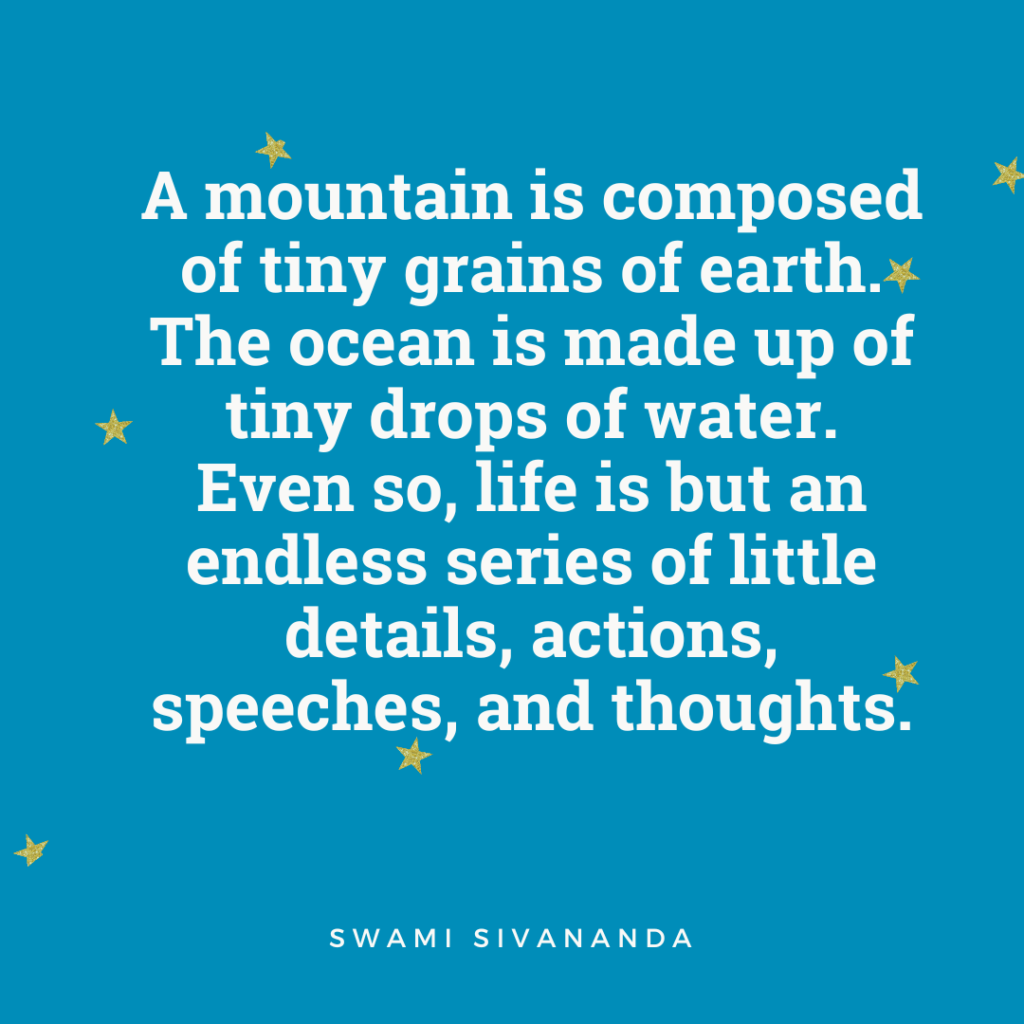
Focus on Improving Clarity
Sometimes overwhelm is caused by a lack of clarity. If we can pause, step back and come up with a plan of action, that can reduce overwhelm. This may involve obtaining needed information or assistance from someone else. When the ADHD brain is unclear on what to do, it often jumps to so many different possibilities that it is quickly overwhelmed.
It’s helpful to learn your symptoms of overwhelm and have an “overwhelm plan” to put in place. Does your neck get tight when you feel overwhelmed? Does your stomach hurt? Maybe you find yourself worrying or wanting to escape? The more quickly you can notice feelings of overwhelm, the more quickly you can take steps to reverse the process.
How Does Coaching Help?
ADHD coaching helps people who are feeling overwhelmed by:
- Providing personalized strategies tailored to your needs.
- Providing support in managing tasks and prioritizing responsibilities.
- Helping break tasks into manageable steps.
- Focusing on developing organizational skills.
- Fostering a sense of control and empowerment in dealing with overwhelm.
And the best part? ADHD coaching is just one part of a comprehensive and multidisciplinary approach to managing ADHD.
About Pam Valdes

Pam Valdes is a certified ADHD Coach here at NextStep. She has a strong background in wellness and counseling. She has provided caring coaching to adults and teens for over 10 years.
Pam specializes in working with adults and teens to address the core issues related to ADHD. As a coach, she helps clients set and stay focused on goals, face obstacles, and develop strategies to handle the responsibilities and tasks that are often made difficult by the symptoms of ADHD.
To make an appointment, click here to get started.
Learn More
10 Tips to Integrate Exercise into Your Daily Routine
Unlocking Focus and Fitness with ADHD Coaching
Living with ADHD comes with its unique set of challenges, but incorporating regular exercise into your daily routine can be a game-changer. Not only does physical activity promote overall well-being, but it can also help manage ADHD symptoms by enhancing focus and reducing hyperactivity.
In this blog, we’ll explore 10 ADHD coaching tips specifically tailored to integrate more exercise into your day.
1. Discover Your Passion
Tailor Your Routine: Identify physical activities that genuinely interest you. Whether it’s dancing, hiking, or playing a sport, choosing activities you enjoy increases the likelihood of making exercise a consistent part of your routine.
2. Create a Structured Schedule
Time Blocking: Allocate specific time slots in your daily schedule dedicated to exercise. This structured approach helps create a routine, making it easier to form a habit.
3. Break It Down
Micro-Workouts: Break your exercise routine into smaller, more manageable segments. Short bursts of physical activity throughout the day can be as effective as a single prolonged session.
4. Incorporate Movement into Tasks
Multitasking: Combine exercise with everyday activities. Opt for a standing desk, take walking meetings, or do light stretches while on conference calls. This way, you effortlessly integrate movement into your workday.
5. Set Achievable Goals
Start Small: Establish realistic exercise goals to avoid feeling overwhelmed. Gradually increase intensity and duration as your fitness levels improve, ensuring a sustainable and positive experience.
6. Accountability Partner
Buddy System: Find an accountability partner who shares your commitment to regular exercise. Having someone to exercise with provides motivation and turns physical activity into a social and enjoyable experience.
7. Explore Mindful Activities
Yoga and Meditation: Activities like yoga or meditation not only contribute to physical well-being but also enhance mental focus. Incorporate these mindful practices into your routine for a holistic approach to ADHD management.
8. Use Technology to Your Advantage
Fitness Apps: Leverage technology by using fitness apps or wearable devices to track your activity levels. Set reminders for exercise breaks to ensure you stay on track.
9. Reward Yourself
Positive Reinforcement: Establish a reward system for meeting your exercise goals. Treat yourself to something enjoyable, creating positive associations with physical activity.
10. Flexibility is Key
Adapt to Changes: Recognize that some days may be more challenging than others. Be flexible with your exercise routine, adjusting it as needed to accommodate life’s unpredictable nature.
How ADHD Coaching Can Help You Adopt New Habits
Integrating exercise into your daily routine as part of ADHD management is not only beneficial for physical health but can significantly impact cognitive function and overall well-being. By incorporating these coaching tips, you can unlock the potential for increased focus, reduced hyperactivity, and an improved sense of balance in your life. Remember, the key is to find what works best for you and transform exercise from a chore into a rewarding and energizing part of your daily routine.
To learn more about ADHD coaching fits into your comprehensive treatment plan, contact us here to schedule your next appointment.
Learn More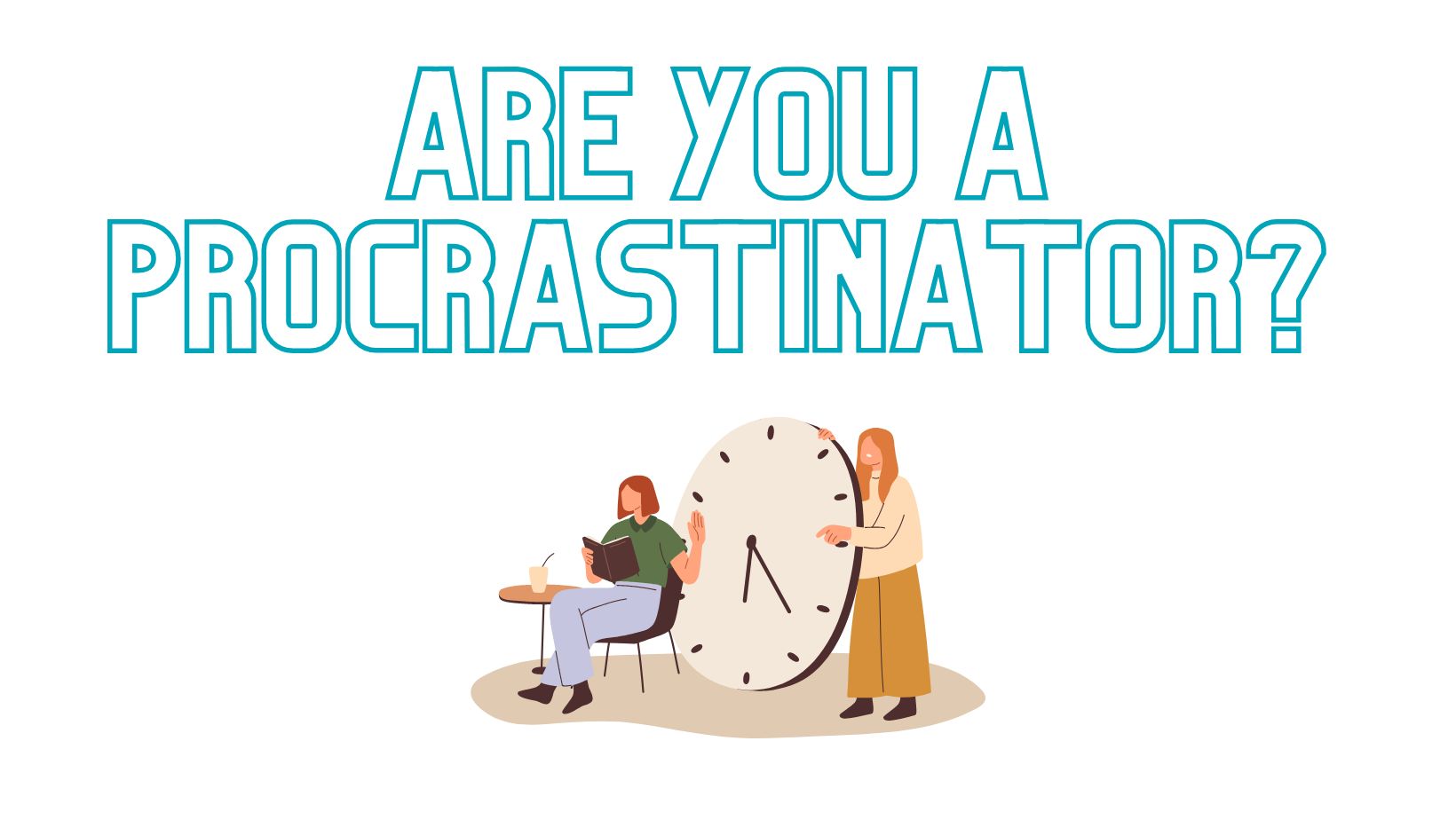
Are You a Procrastinator? [Quiz]
Nearly everyone procrastinates at some point.
For those living with ADHD, patterns of procrastination can be persistent and pervasive over time and create significant difficulties in school, career, and life at home.
If you have ADHD, identifying your own patterns of procrastination and learning to manage it can be a vital component of comprehensive treatment.
The Connection Between ADHD and Procrastination
Procrastination can occur in persons without ADHD, and isolated procrastination is NOT diagnostic of ADHD.
ADHD is a neurodevelopmental condition that can affect a person’s ability to regulate attention, manage time, and organize tasks effectively. The symptoms present in childhood and/or adolescence and may persist into adulthood. Procrastination is a very common symptom of ADHD and emerges from underlying difficulties with initiating tasks, sustaining focus, and managing priorities.
Persons with ADHD who gain insight into their procrastination patterns and seek appropriate support can experience significant improvements in this area.
NextStep4ADHD offers holistic and multidisciplinary care, specifically tailored to individuals with ADHD, to provide comprehensive strategies and skills for managing procrastination and improving overall productivity.
Quiz: Are You a Procrastinator?
Instructions: Answer each question honestly by selecting the option that best describes your behavior or preferences. At the end of the quiz, your score will help determine if you tend to procrastinate a lot, a little, or not at all. Remember, this quiz is just a self-assessment and not a clinical diagnosis. If you feel you may benefit from support, consider seeking holistic and multidisciplinary care at NextStep4ADHD to learn skills to manage procrastination effectively.
- When faced with a task or assignment, how often do you find yourself delaying getting started?
- a) Almost always
- b) Sometimes
- c) Rarely or never
- How often do you find yourself putting off tasks until the last possible moment?
- a) All the time
- b) Occasionally
- c) Hardly ever
- When given a deadline, how often do you end up finishing the task just in time or even late?
- a) Consistently
- b) Occasionally
- c) Rarely or never
- How frequently do you catch yourself engaging in non-essential activities to avoid starting important tasks?
- a) Most of the time
- b) Occasionally
- c) Rarely or never
- When you have a long-term project or assignment, how often do you struggle with breaking it down into manageable tasks?
- a) Always
- b) Sometimes
- c) Rarely or never
- How frequently do you find yourself making excuses or justifications for delaying tasks?
- a) Very often
- b) Occasionally
- c) Rarely or never
- When faced with a challenging or complex task, how likely are you to procrastinate even more?
- a) Highly likely
- b) Occasionally likely
- c) Not likely
- How often do you feel overwhelmed by the number of tasks on your to-do list, leading to avoidance or delay?
- a) Frequently
- b) Occasionally
- c) Rarely or never
- How often do you find yourself underestimating the time required to complete a task, resulting in last-minute rushes?
- a) Most of the time
- b) Occasionally
- c) Rarely or never
- How likely are you to prioritize immediate gratification (e.g., leisure activities) over important tasks that require effort and time?
- a) Very likely
- b) Sometimes likely
- c) Not likely
Scoring:
- For questions 1, 2, 3, 4, 6, 7, 8, 9, and 10, assign the following points:
- a) Almost always or most of the time: 3 points
- b) Sometimes or occasionally: 2 points
- c) Rarely or never: 1 point
- For question 5, assign the following points:
- a) Always: 1 point
- b) Sometimes: 2 points
- c) Rarely or never: 3 points
Results:
- 10 to 17 points: You exhibit minimal signs of procrastination. Congratulations on managing your tasks effectively!
- 18 to 24 points: You occasionally struggle with procrastination. Consider learning strategies to enhance your productivity and time management skills.
- 25 to 30 points: Procrastination seems to be a significant challenge for you. Seeking holistic and multidisciplinary care at NextStep4ADHD can provide valuable support and tools to manage procrastination effectively.
Remember, this quiz is not a diagnostic tool but serves as a self-assessment. If you’re concerned about your procrastination habits, seeking professional advice can be beneficial for tailored guidance and support.
Get All of Your ADHD Care Under One Roof
ADHD coaching and other multidisciplinary treatments offer invaluable support in overcoming the challenges associated with ADHD. Through personalized coaching sessions, you can gain strategies to enhance time management, improve organizational skills, develop effective task initiation techniques, and cultivate self-awareness.
Additionally, holistic treatments encompass various therapeutic approaches, such as counseling, medication management, mindfulness practices, and lifestyle adjustments, to create a comprehensive and tailored plan for managing ADHD symptoms. By embracing holistic and multidisciplinary care at NextStep4ADHD, you can unlock your potential, thrive in daily life, and achieve greater success.
Take the next step towards managing your ADHD effectively. Contact NextStep4ADHD today to explore the benefits of ADHD coaching and multidisciplinary treatments that will empower you with the skills and support needed to overcome challenges and lead a fulfilling life. Start your journey towards holistic care and discover the transformational possibilities.
Learn More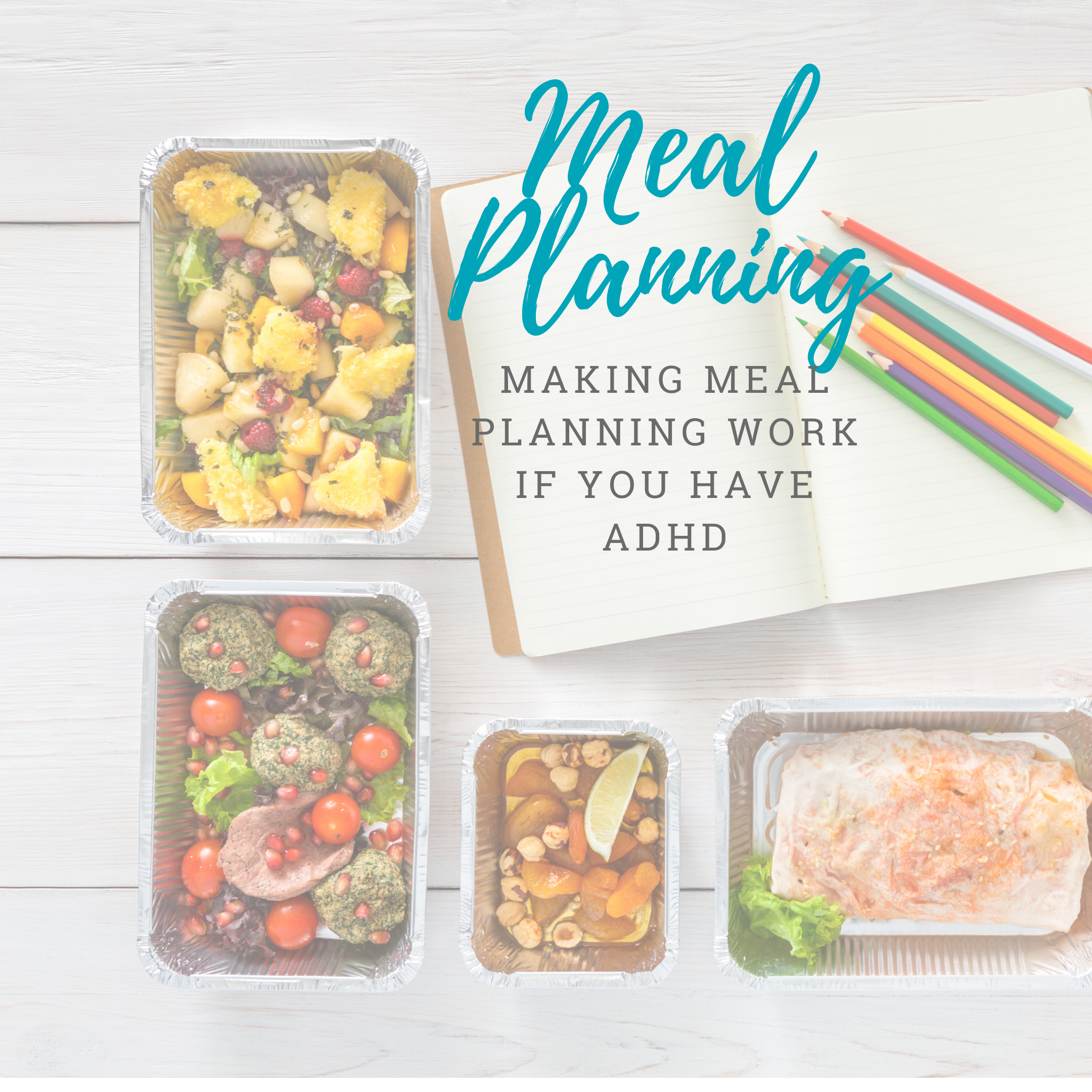
Meal Planning & ADHD: 9 Tips to Make It Work
Planning meals for your family can be stressful — especially if ADHD leads to feeling disorganized and unprepared. Learning how to meal planning can eliminate some stress around mealtimes.
Why Is Meal Planning Hard If You Have ADHD?
Meal planning refers to taking the time to choose your meals for the week. It can also include making your grocery list for the week too. So why is this so difficult if you have ADHD? Meal planning requires decision-making, planning, prioritizing — all of which are executive function skills. Because ADHD can lead to struggles with executive function skills, the struggle makes sense.
In other words, meal planning can be overwhelming and incredibly ADHD-unfriendly. The good news is that meal planning is a skill – and skills can be learned. In this article, we’ll explore the benefits of meal planning as well as 10 tips to make meal planning less overwhelming.
5 Benefits of Meal Planning for Your Family
Meal planning provides many benefits for you and your family. Exploring these benefits can be really motivating to stick with your plan. Think of this as your WHY as you embark on meal planning.
Meal planning can provide the following five benefits:
- Reduces the feelings of overwhelm around planning for meals.
- Helps you eat healthier. Planning ahead gives you a better chance of planning healthier meals.
- Saves you time. Save time by avoiding the need to run to the store multiple times. You’ll also save time each night because you won’t have to think about what to make — you already know.
- Saves you money. You can save money by reducing cutting out impulse buys and by avoiding duplicate purchases. Planning ahead also gives you an opportunity to take advantage of the weekly sales at your grocery store. Planning ahead also helps you stick with your budget.
- Helps you cut back on fast food. We’ve all been there: it’s late and dinner isn’t made yet — so you order take-out. Planning ahead cuts out last minute fast-food choices.
In the next section, we’ll share tips for making meal planning less overwhelming.
9 Strategies for Making Meal Planning Easier
1. Make a Master List of 10 Recipes
A master list of recipes provides quick and easy references to some of your family’s favorite recipes.
Tips for making a master list:
- Include plenty of easy recipes for busy nights (think: Instapot or CrockPot recipes)
- Sort your recipes by category (beef-based, pasta dishes, chicken, side dishes, soups, etc)
- Keep them written down (in a blank journal, on a Word document, or on flashcards in a recipe box organizer)
When meal planning, you can refer to your master list to fill out your weekly meals. You can use as many recipes as you want. You might use meals only from your master list. Or, you can use some from your list and try 1-2 new recipes each week. Do what works for you.
Need inspiration? You get your free ADHD-friendly recipe book here.
2. Don’t Try to Memorize Your Meal Plan
 Trying to memorize your meal plan will increase the risk that you deviate from the plan. You can write your meal plan:
Trying to memorize your meal plan will increase the risk that you deviate from the plan. You can write your meal plan:
- In a daily paper planner
- In an app
- On a dry erase board hanging in your kitchen
Tip: Using the dry erase board in the kitchen might be helpful to make sure your whole family is on the same page. This can limit the “What’s for dinner?” question.
3. Plan All of Your Meals
If you don’t make a plan for breakfast or lunch, you’ll more likely to either skip the meal or grab something quick from a drive-thru.
Include all of your meals when you meal plan. This doesn’t mean that breakfast or lunch has to be elaborate, time-consuming meals, either.
Examples include:
- Hard-boiled eggs and toast and a piece of fruit
- Overnight oats
- Brown bag lunch ideas such as leftover meat from dinner as a sandwich
Even if breakfast and lunch are quick meals, planning for them gives you time to get them ready. For example, if you know you want hard-boiled eggs for breakfast, you can make sure you allot time in the morning to get that done.
4. Check Your Daily Schedule
What if you have to work late on Tuesday? What if the kids have a dance recital on Thursday? Even on the busiest nights, you’ll still need dinner — but by taking your calendar into consideration, you ensure that you’ll have dinner ready.
Tip: You might designate busy nights as the slow-cooker night. You can also designate busy nights as leftover night — just reheat and go!
5. Check Your Pantry
When you’re meal planning, you don’t need to make 7 dinners each night from scratch with a pantry overhaul. You can use what you already have in your pantry to inspire your meals for the week.
For example, if you have a lot of canned tomatoes in your pantry, then plan a spaghetti night. Lots of chicken in your freezer? Try a pulled chicken recipe in your crockpot.
6. Choose In-Season Produce
Plan meals based on what’s in season. For example, planning a berry-based salad in the middle of winter might not lead to the best salad. Out-of-season produce tends to have less flavor and be more expensive.
Tip: If you want a fruit that is out-of-season, try the frozen version.
7. Don’t Forget to Plan for Leftovers
One of the most frustrating things is to end the week with a fridge full of leftovers. Instead, plan for your leftovers. Leftover night can be quite handy on busy nights.
Leftover nights cut down on wasted food, and it also gives you a night off of cooking.
How to make leftover nights not-so-boring:
- Get creative! If you don’t like having the same meal twice, you can repurpose your meals. For example, if you had steak on Monday, use the leftover steak to make steak tacos on Wednesday.
- Leftovers aren’t just for dinner. Make your lunches out of dinner leftovers. For example, if you have leftover roast chicken, you can slice it and top your salad with it.
8. Make Extra and Freeze It
Time-permitting, make a double batch of your favorite recipes. You can eat one batch for dinner, and then freeze the second batch for later. This can come in handy the following week if you need a quick dinner.
What can you freeze? Consider making double batches of meals such as:
- Soups (Lay flat in a Ziploc to freeze; once frozen, you can turn upright and stack soup easier.)
- Chili
- Bolognese sauce
- Waffles
- Meatloaf or salmon loaf
9. Schedule Your Meal Planning Time
The first step to meal planning is actually doing it. Set aside designated time to work on your meal plan in peace. It shouldn’t take more than 30 minutes.
Need More Guidance?
If you’re still feeling overwhelmed with planning and organizing tasks, we can help. Here at Next Step 4 ADHD, we provide comprehensive, multimodal support, including:
- Medication management
- Therapy
- ADHD coaching
- Online courses, including our FREE self-care course which focuses on nutrition
To make an appointment or to learn more, call us at 502-907-5908. You can also request an appointment here.
Learn More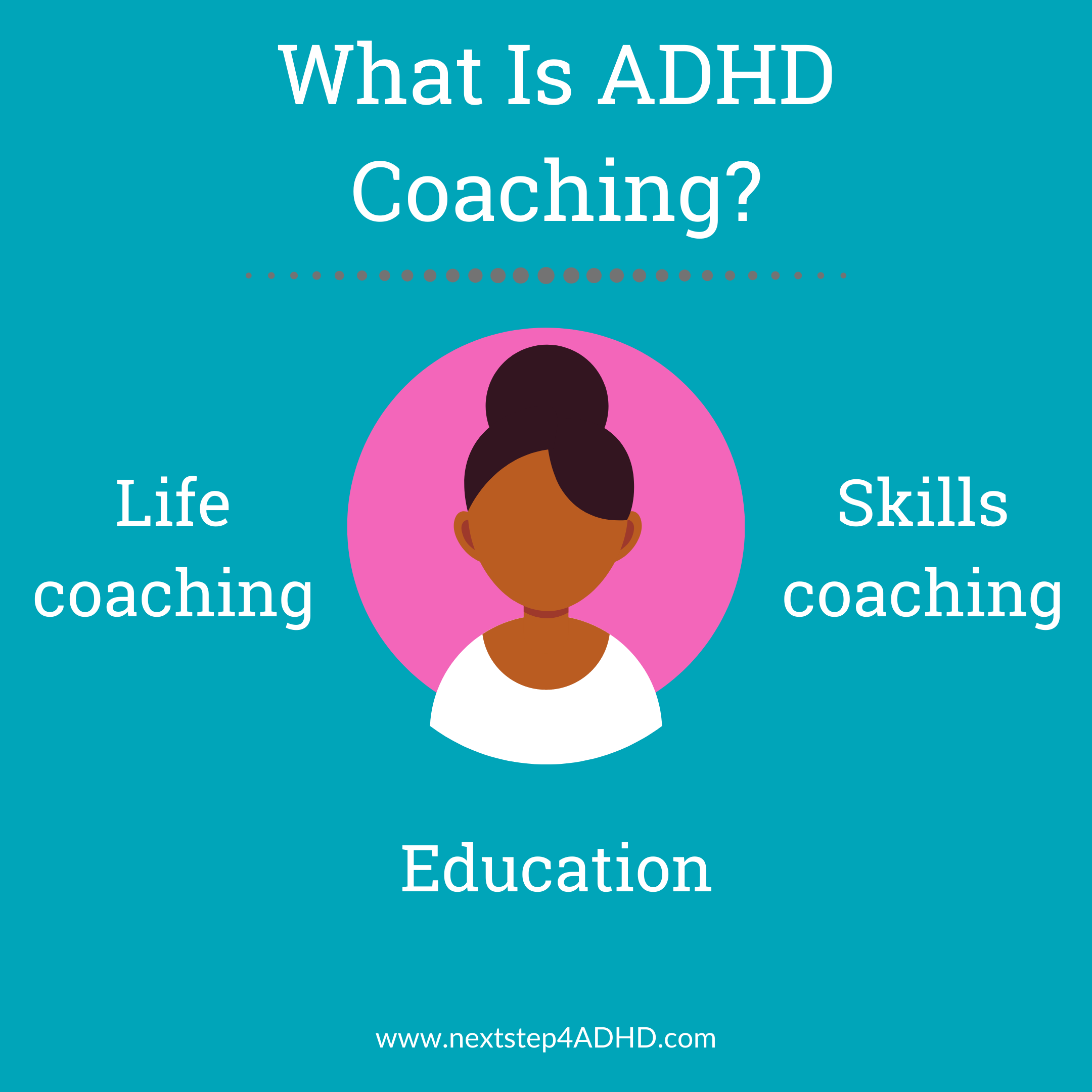
ADHD Coaching: Everything You Need to Know
An ADHD coach is a coach specifically trained to help adults, teens, and children with attention deficit hyperactivity disorder (ADHD) better manage their lives. ADHD coaching is also helpful for parents of children with ADHD. Coaching is a collaborative partnership designed to help you bridge the gap between where you are and where you want to be. Your coach will help you set and achieve goals through guidance, support, and accountability. Together you develop strategies to tackle the challenges often experienced by those with ADHD. You can learn to be more organized, improve concentration and focus, manage time, and prioritize. Coaching can even help you overcome procrastination! Your coach will help you tap into your strengths and learn to be kinder to yourself in order to create the extraordinary life you deserve.
What is ADHD Coaching?
 ADHD coaching is a blend of life coaching, skills coaching, and education. It uses all three elements to help clients cultivate the self-awareness required to understand and work with their own unique brains, thereby recognizing, appreciating, and sharpening their strengths to reach their goals, enjoy their passions, and achieve lifelong well-being.
ADHD coaching is a blend of life coaching, skills coaching, and education. It uses all three elements to help clients cultivate the self-awareness required to understand and work with their own unique brains, thereby recognizing, appreciating, and sharpening their strengths to reach their goals, enjoy their passions, and achieve lifelong well-being.
In a nutshell:
• ADHD coaching helps people with ADHD come up with specific and practical strategies to help them deal more effectively with daily challenges.
• Coaches collaborate and problem-solve with clients, help them identify and define the problem, and then brainstorm potential solutions with the client.
They also help clients implement what they’ve learned in their daily life.
Coaching Versus Therapy
If you’re struggling with the symptoms of ADHD, you might wonder if you need coaching, therapy, or a combination of both. The following chart depicts some of the key benefits of each modality. Coaching and therapy have their own unique benefits, but they also share a lot of the same benefits.
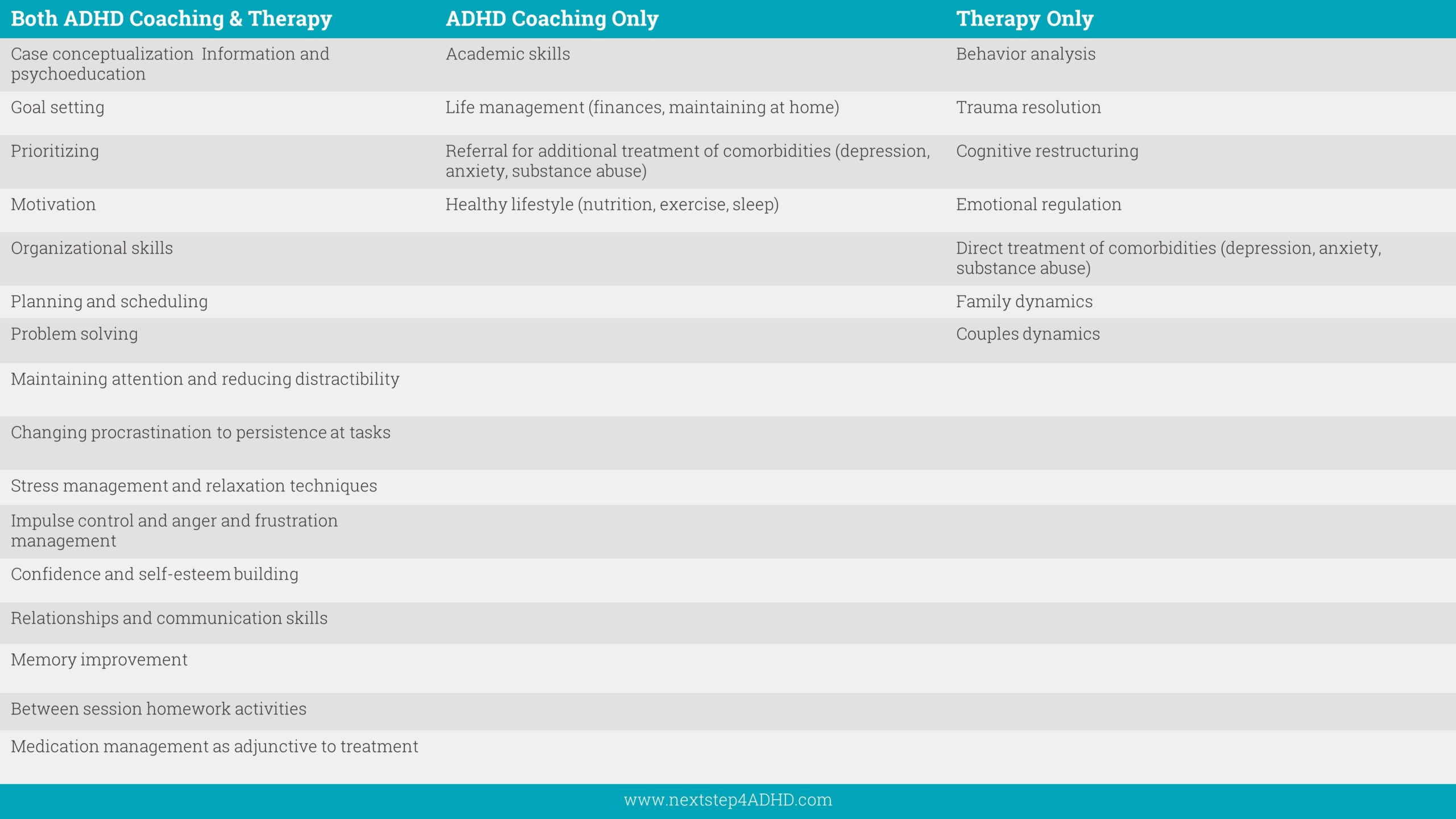 A few takeaways:
A few takeaways:
- Therapy is about insight; coaching is about action and getting things done. (Favorite, 1995)
- Coaching focuses on specific goals and objectives. It is a pragmatic, behavioral, results-oriented, “just do it” approach, as opposed to a process, insight-oriented, intellectual approach (Levrini & Prevatt, 2012).
- The structure of coaching tends to be open and flexible. Text or email support and reminders between coaching sessions is common and recommended.
Coaching may require ongoing support, encouragement, structure, accountability, and sometimes gentle but firm confrontation (Murphy, 2005).
Here’s another way to look at the benefits and differences of therapy and coaching:
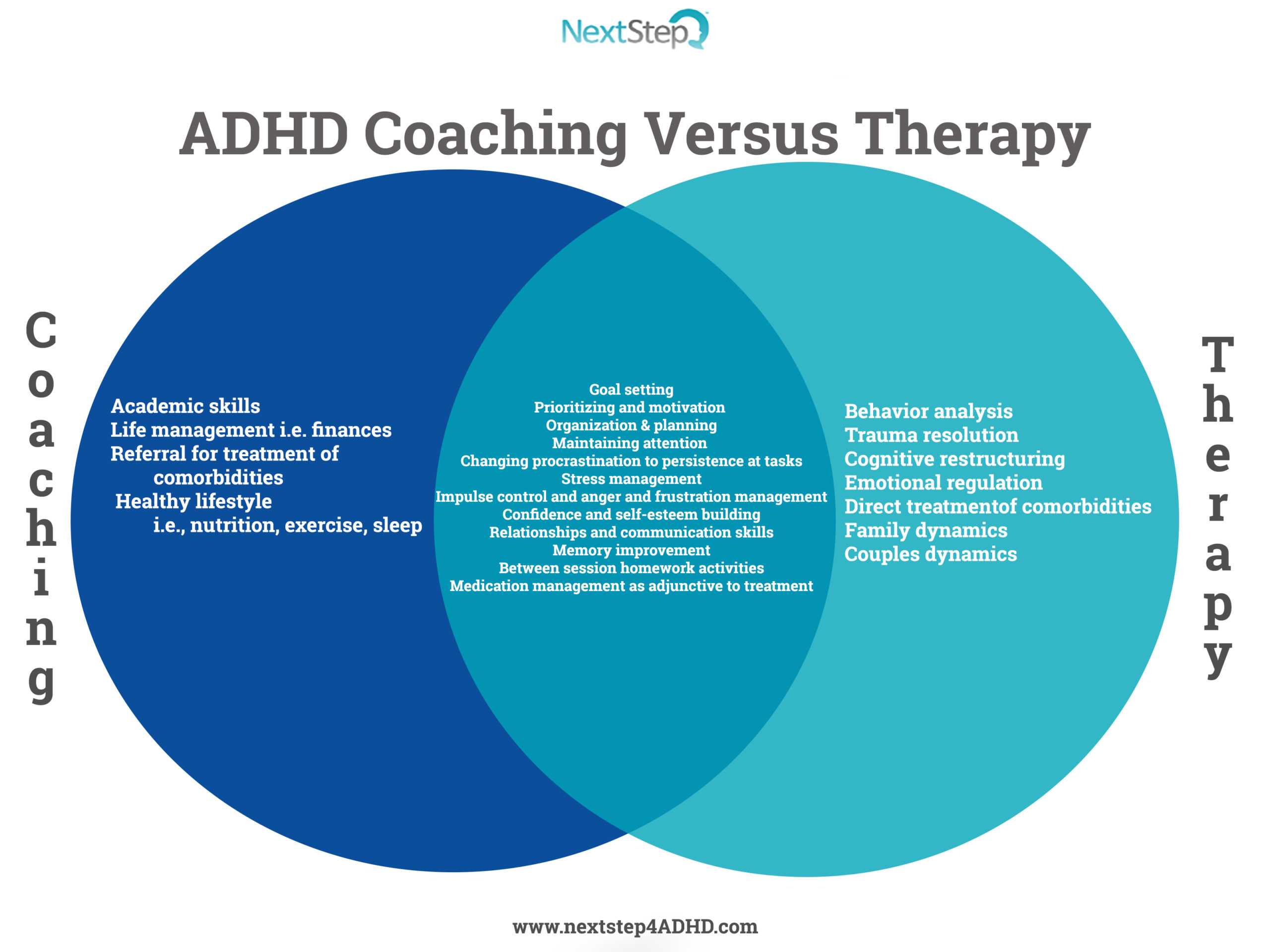 In a nutshell:
In a nutshell:
Coaching targets the core impairments of ADHD such as planning, time management, goal setting, organization, and procrastination. Coaching is results oriented, with specific behavioral goals.”
Coaching Services at Next Step 4 ADHD
Here at Next Step 4 ADHD, coaching services are part of our multidisciplinary treatment philosophy. Coaching services are available to adults, parents, teens, and children in any of the 50 states. ADHD coaching is offered via telehealth so you can get the guidance you need straight from the comfort of your own home.
Coaching can improve deficits in executive skills, including time and task management, planning, organization, as well as strategies to manage mindset and to minimize the impact of ADHD.
Adults
Coaching is recommended for adults with ADHD who have specific goals that they want to work on and want more support, structure, and accountability than they can provide for themselves. Whether you need help with organization, nutrition, improving your sleep, or your relationships, we’ve got you covered.
Teens
Coaching is available for high school-aged teenagers, 14 yrs – 18 yrs old. According to the Center for Disease Control and Prevention (CDC), about 3 million teens live with ADHD.
Parents
Coaching sessions aren’t just for the individuals who are diagnosed with ADHD. Parents may benefit from parent coaching sessions. During these sessions, parents will learn strategies for parenting children with ADHD.
Kids
Coaching for children is available for children in 6th grade and up. Coaching can help with planning and organization at school and home. Kids typically will be coached with their parents, who are often involved in sessions.
Coaching Packages
Motivation gets you started, but habit keeps you going. That’s why we bundle our coaching sessions into packages so that you can build the habits you need to create life-changing habits.
What’s a coaching session like? Our coaches take the time to get to know YOU and your struggles. This means that each session is geared towards your unique goals, strengths, and challenges. With text and email support, you’re just a call or click away from your ADHD coach.
ADHD Coaching for College Students
ADHD may present unique challenges for college students — for both in-person and online learners. College courses demand a lot of focus, time management, memory, and follow-through. But if you’re a college student living with ADHD, these struggles (including procrastination) are exacerbated by the intense pressure of daily classes, assignments, essays, lab work, and exams. As intimidating as college courses can be, it is also the perfect opportunity to shine — if you understand the way your brain works.
Together, we’ll build a plan customized for you…
- We’ll help you organize your space — and schedule — around college’s notoriously tight deadlines
- We’ll help you build study strategies designed to nurture your focus on your attention
- We’ll help you prioritize self-care to support your physical and mental well-being
- We’ll help you develop a practice of mindfulness
- We’ll help you develop positive social relationships
- We’ll help you develop a growth mindset
And after graduation? We offer coaching for young adults too! We’ll be with you through every phase of your journey from graduation to job hunts to your career.
Is Coaching Right for You?
About Pam Valdes
 Pam Valdes is a certified Health Coach with a focus on ADHD coaching. She has a strong background in wellness and counseling. She has provided caring coaching to adults and teens for over 10 years.
Pam Valdes is a certified Health Coach with a focus on ADHD coaching. She has a strong background in wellness and counseling. She has provided caring coaching to adults and teens for over 10 years.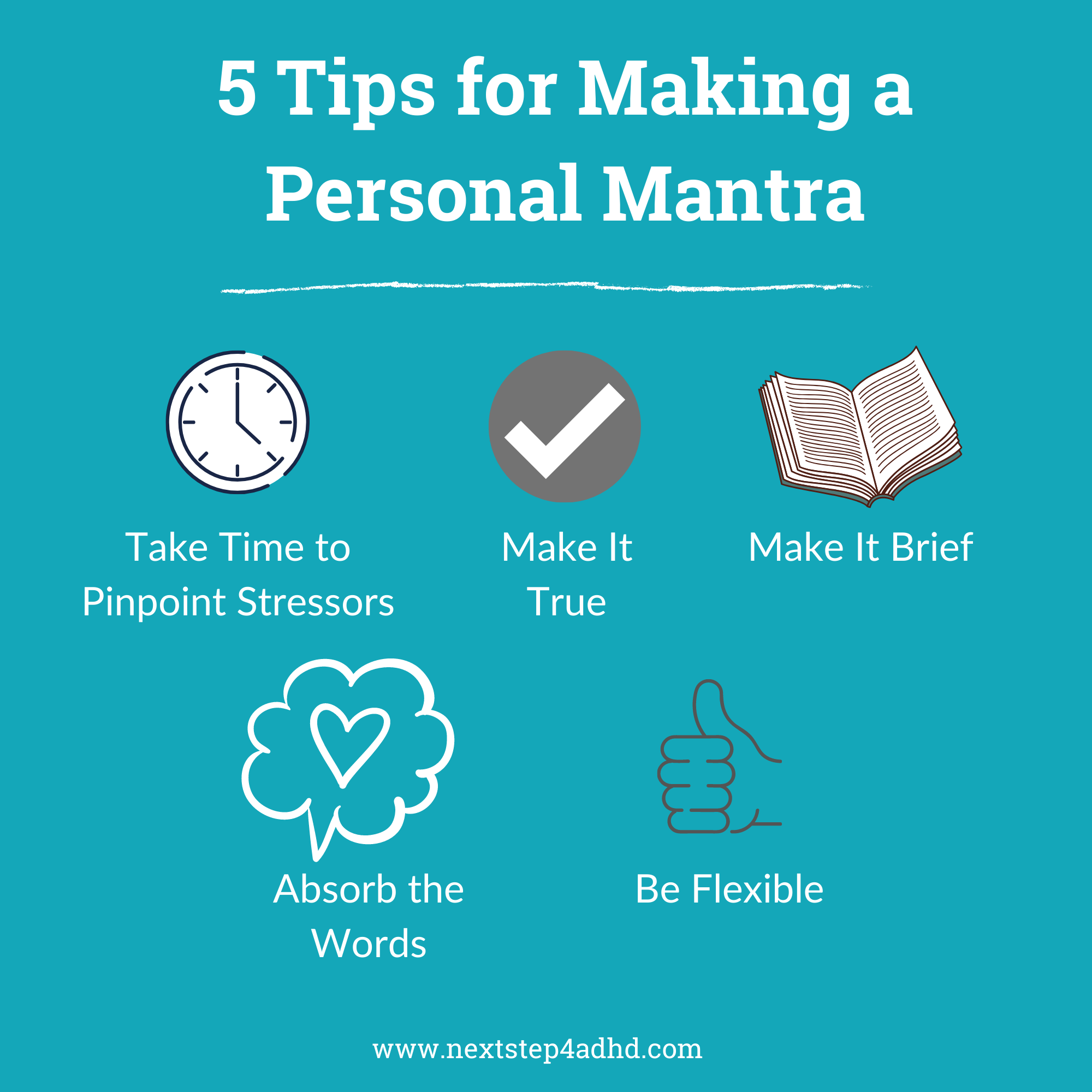
Using Mantras to Reduce Stress
Stress has become a way of life for many of us these days, and the reality is that no one likes to feel stressed.
So what can we do about it?
We touched base with certified health coach Pam Valdes to learn how to manage stress with personal mantras.
Stress has become a way of life for many of us these days. Just take a quick look at any news outlet, and you are instantly bombarded with any number of serious issues, all of which can seriously stress you out. You may or may not have much control over the current crises in your life, but you can take control of the stress. You won’t eliminate stress entirely, but you can learn techniques to manage it, and you can actually learn from the stressors in your life.
Years ago, stress taught me a valuable lesson.
My family and I had made the 8-hour trip to visit my aging parents a few states away. My father had dementia and was in the advanced stages of Parkinson’s. My mother served as his caregiver, an exhausting and often overwhelming role. Upon our arrival, we were shocked to find my mother in worse shape than my dad. She had severely injured her back trying to care for him. During our visit, it became clear that I could not leave them in this situation. I sent my family home while I stayed behind to help. Every day was worse than the one before, and finally my mom was hospitalized. Her doctor made it clear that she could no longer care for my father and would, in fact, need round-the-clock care herself. Within days, she was transferred to a rehab center, where she stayed for two months. We made the difficult decision to move my father to an assisted living facility, as there would be no one to care for him once I returned home.
It was a very emotional time for the entire family. I stayed for a very stressful three weeks trying to take care of everyone and everything. I felt torn in all directions. I cancelled all of my appointments as I tried to handle my parents’ bills and other immediate needs. When I was with my mother, I felt guilty for leaving my father alone and confused in his new surroundings. When I was with my father, I felt guilty for leaving my mom alone and in pain. I felt guilty for not being there for my family back home. It seemed like there were a million difficult decisions to be made every day, and the pressure to make the best decisions weighed on me night and day. My sleep was fitful, and my stomach was in knots. I felt like I was letting everyone down.
Eventually I hit a breaking point and realized I had to make a change. I had a long talk with myself, and I realized that my feelings of intense pressure and guilt, though understandable, were compounding the problems. I asked myself what I would say to my best friend if she were in my situation.
I immediately realized what I wouldn’t say.”
I wouldn’t tell her (or even think) that she was letting everyone down. I wouldn’t tell her she should feel guilty. Instead, I would tell her that she was doing the best she could to handle a difficult situation with love and integrity. I would tell her that her worry was making everything worse and that she needed to take care of herself. I decided right then that, for the sake of all concerned, I needed to treat myself like my own best friend. I developed a mantra that I repeated to myself numerous times a day: “I’m doing the best I can, and that’s good.” Not just OK, but good. I focused on what I could do and on creating quality time with the parent I was with.
It was interesting. Nothing changed, and yet everything changed. When I was with one of my parents, there were more smiles and less worry. I focused on being fully present with them instead of running through the endless “to-do” and “what-if” scenarios in my head. The change was immediate. My parents were happy to see me and hear about each other’s progress. A sense of calm and love permeated our visits. I hadn’t realized how much my stress was bleeding onto them and causing them worry. It was so simple, but for me, it was illuminating.
I’d like to brag and tell you that I’ve never let stress get the best of me in the years since, but that’s not true. However, I am much more likely to catch myself and short-circuit the stress and worry connections in my head. I stop, figure out what I need, and I have that serious talk with myself. Then I create a mantra to repeat to myself as often as needed to reclaim my spot in the driver’s seat of my life and relegate stress to the trunk where it belongs. The stress is still there, but it’s no longer riding on my shoulders.
Create Your Own Mantra and Reduce Stress
You can try this simple technique yourself to create some peace in your life. A mantra may sound mysterious, but it’s simply a word, or words, that are repeated to aid concentration and to guide our thoughts. What we tell ourselves matters – it really matters. That endless loop of thoughts in your head has a direct impact on how you feel and what you do. To be your best you, learn to talk to yourself as you would your best friend. With your mantra, you can create a calm moment, and that moment can be a real catalyst for change.
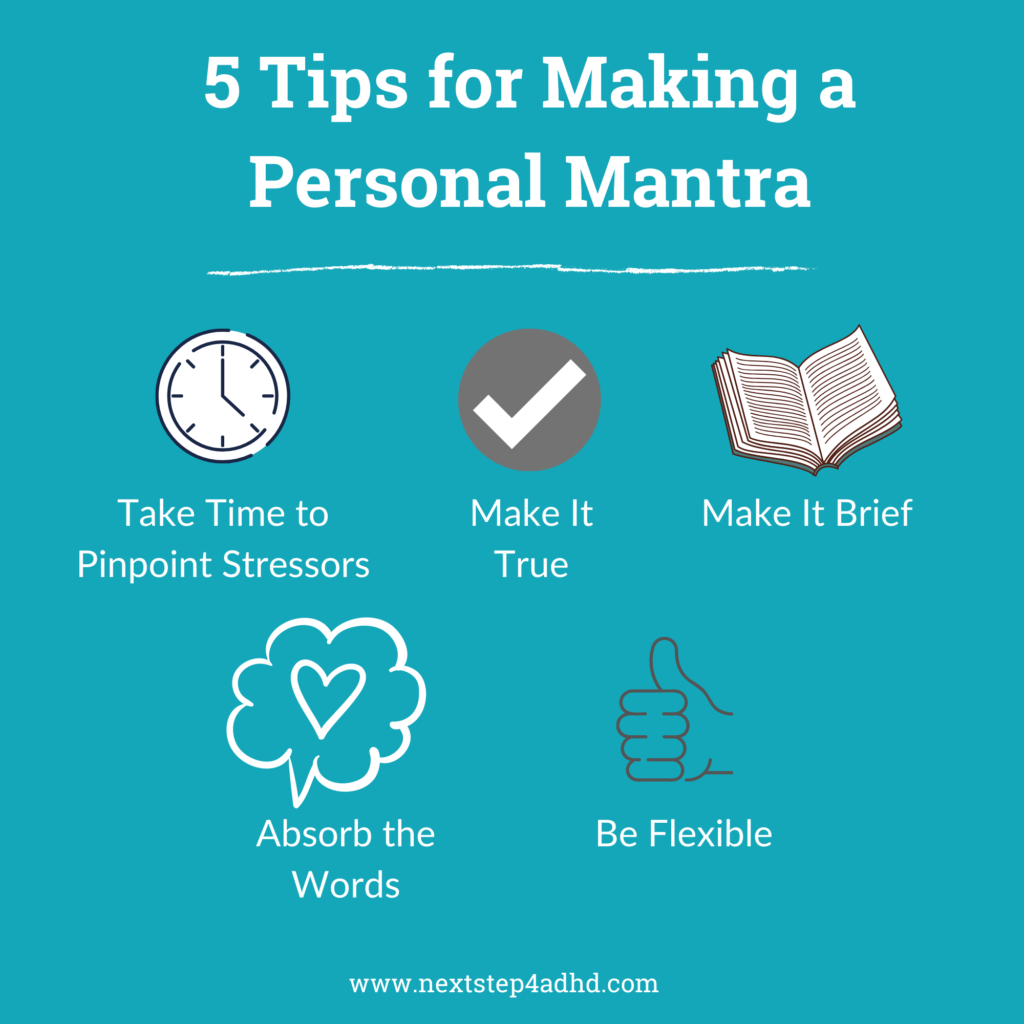
Here are some tips to create your own powerful mantra:
• Take some time to figure out what thoughts are causing you stress and what you need to hear instead.
• Make it true, not just wishful thinking. If you don’t believe your mantra, it won’t help.
• Keep it brief – maybe even one word, a short sentence at most – something you can easily remember and repeat.
• When you repeat your mantra, take a deep breath, and really absorb the words you say. Don’t allow them to become automatic and meaningless.
• Be flexible. The mantra you choose today may not be the mantra you need tomorrow. Allow your mantra to change as your needs change.
Want a more in-depth training on creating a personal mantra? Tune in here:
About Pam Valdes

Learn More

ADHD Diet: What We Eat & Why It Matters If You Have ADHD
We all know that it’s important to eat healthy foods, but did you know that good nutrition can make a huge difference in the management of ADHD symptoms? A poor diet can make anyone feel sluggish, distracted, and even depressed. [1] Add ADHD to the mix, and it is easy to see how a low-nutrition diet can intensify the daily challenges of living with ADHD. Many people find that incorporating nutrition-rich foods into their lifestyle greatly improves troublesome symptoms of ADHD.
That’s why the ADHD coaches at NextStep 4 ADHD are happy to help you navigate the challenges of establishing a nutrient-dense ADHD-friendly diet. From creating time-saving meal prep strategies to eliminating unhealthy food choices, our coaches are with you every step of the way.
In the meantime, continue reading to learn more about nutrition and how it affects those living with ADHD.
Why Good Nutrition Matters
You are what you eat. You’ve heard the saying, but have you ever really thought about it? What you eat can energize, provide essential nutrients, and power all of the major functions of your body.
What you eat and the quality of what you eat has a profound effect on your body. This is why runners often eat a carb-heavy meal before a run; because they know carbohydrates provide energy for the body. The opposite is also true. Poor nutrition impacts the body, too. For example, studies show that diets high in sugar tend to increase cravings and feelings of hunger. [2]
Here are a few benefits of a well-balanced, nutrient dense diet. Good nutrition:
- Can improve brain function
- Can increase energy levels and motivation
- Promotes general good health
- Can enhance your mood
- Can help you maintain a healthy weight
- Can help control symptoms of ADHD [3]
- Can improve sleep habits
- Balances blood sugar levels, which affect all of the above
The takeaway: good nutrition is important for a healthy mind and body, and in the next section, we’ll explore how ADHD can impact your food habits.
How ADHD Can Impact Food Habits
If you struggle with impulsivity or time blindness, you might be tempted to grab a fast meal, and unfortunately, “fast” isn’t always healthy. This isn’t the only way that ADHD can impact food habits. Below is a list of common ADHD symptoms and how those untreated symptoms can impact food habits.
Forgetfulness
Forgetfulness is a common ADHD symptom, and it can increase the likelihood that you forget to go shopping for food or even forget to eat. When you realize how hungry you are, you may then make desperate, unhealthy food choices.
Impulsiveness
If you’re feeling hungry, you might reach for whatever looks appealing in the moment.
Emotional regulation and stress tolerance
If you’re feeling stressed or overwhelmed, you’re more likely to engage in emotional or binge eating. According to the American Psychological Assocation, 38% of adults report stress eating as a way to cope with high stress levels.
Lack of Planning/Prioritization
Planning can be difficult for those with ADHD, and difficulty planning can affect what you eat as well. This may create challenges with:
- Planning shopping trips
- Meal planning
- Setting aside time to prepare healthy meals
In addition, difficulty planning can make it hard to come up with a realistic plan to improve eating habits.
Procrastination
The notion of procrastination is nothing new. It’s been discussed in literature dating back to Ancient Greece! [4] However, procrastinating can make it easy to put off the goal of improved nutrition.
Reduced Appetite
Stimulant medication may reduce your appetite. [5] While a reduced appetite can help prevent overeating (simply because you’re less hungry), a reduced appetite can work against optimal nutrition. If a reduced appetite results in skipping meals, it can make it challenging to consume adequate daily nutrients.
A Balanced ADHD Diet
A balanced ADHD diet looks a lot like a diabetes-friendly diet. Why? Because controlling blood sugar levels is beneficial in countless ways.
Have you ever waited too long between meals and gotten a headache, felt shaky, had brain fog, or become irritable? That’s an indication that your blood sugar levels have dropped to the point of causing physical symptoms. Time to listen to your body and eat! Better yet, plan ahead to avoid blood sugar crashes. By the time you experience symptoms, your body is going to crave simple carbohydrates to quickly raise your blood sugar levels. You likely won’t be reaching for broccoli at this point.
Maintaining healthy blood sugar levels helps to stabilize many symptoms of ADHD and can increase the likelihood of sticking with a high-nutrition diet.
A healthy diet is as much about what you eat as what you don’t eat. A balanced ADHD diet should include:
- Protein with every meal
- Vegetables and/or fruit with every meal
- Healthy fats like omega 3 fatty acids
- Fiber
It’s important to avoid:
- Processed foods
- High-sugar foods
- Artificial sweeteners
- Artificial dyes & preservatives
In addition to avoiding unhealthy additivies, avoid an attitude of deprivation – focus on incorporating healthy foods you love!
It may seem like a big task to overall your diet, but it can be done. Like all endeavors, remember that all journeys start with just one step.
But How Can You Improve Your Diet?
Keep these tips in mind:
- Start small. Consider focusing on one meal of the day. Maybe you want to start eating a healthy breakfast, packing a lunch for work, or learning some healthy recipes for dinner. Whatever it is, decide how many days per week you could do this, and make a plan.
- Before you start, go shopping. All the good intentions in the world can’t override a hungry stomach and nothing to eat but junk food. Make sure that you always have healthy food choices on hand, both at home and at work.
- Consider finding a friend or coworker (or coach!) who will start on a healthy eating plan with you. This adds in a layer of accountability and encouragement.
- Don’t stress over perceived failures. Establishing new habits takes time. It’s normal to fall back to old, easy eating patterns on your road to healthier eating. Just press restart on your healthier choices that same day. Keep at it, and your “fall-backs” will happen less often.
- Make it fun! Find ways to encourage yourself. Research recipes, try new foods, talk with a “foodie” friend who can give you some tips. Make your mealtime aesthetically pleasing – put on some music, clear the table of clutter, sit down and truly enjoy your food.
- Celebrate every small victory. Acknowledge your efforts as well as your successes. This not only feels good and encouraging, but it actually increases the chances of repeating the positive behavior. If you want to succeed with your healthy eating plan, be willing to treat yourself like a good friend.
Ready to Give Your Diet a Makeover? We’re Just a Call or Click Away
At NextStep 4 ADHD, we’re happy to provide 1:1 coaching for ADHD — and you don’t have to make the trip into our office. If you’re struggling to eat a well-balanced diet, we offer online ADHD coaching via telecoaching, coaching over the phone, or in-person coaching in our convenient Kentucky offices in Louisville and Lexington. Call the location of your choice, or send us a message to request more information.
Don’t forget to sign up for a membership so you can stay up-to-date with the latest news!
References:
- Pelsser, Lidy M., Klaas Frankena, Jan Toorman, Huub F. Savelkoul, Anthony E. Dubois, Rob Rodrigues Pereira, Ton A. Haagen, Nanda N. Rommelse, and Jan K. Buitelaar. “Effects of a Restricted Elimination Diet on the Behaviour of Children with Attention-deficit Hyperactivity Disorder (INCA Study): A Randomised Controlled Trial.” The Lancet, vol. 377, no. 9764, 2011, pp. 494-503.
- Penaforte, Fernanda Ro, et al. “Short-Term Impact of Sugar Consumption on Hunger and Ad Libitum Food Intake in Young Women.” Nutrition Research and Practice, The Korean Nutrition Society and the Korean Society of Community Nutrition, Apr. 2013.
- Pelsser, Lidy M. J., et al. “A Randomised Controlled Trial Into the Effects of Food on ADHD.” European Child & Adolescent Psychiatry, vol. 18, no. 1, 2008, pp. 12–19., doi:10.1007/s00787-008-0695-7.
- https://www.psychologicalscience.org/observer/why-wait-the-science-behind-procrastination
- Jeffers, Amy J, and Eric G Benotsch. “Non-Medical Use of Prescription Stimulants for Weight Loss, Disordered Eating, and Body Image.” Eating Behaviors, U.S. National Library of Medicine, Aug. 2014, www.ncbi.nlm.nih.gov/pubmed/25064292.
